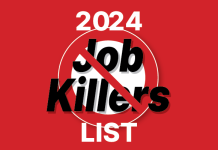 A California Chamber of Commerce-opposed bill that will burden California’s businesses by imposing onerous and unnecessary climate-related reporting requirements is expected to be heard in the Assembly Appropriations Committee today.
A California Chamber of Commerce-opposed bill that will burden California’s businesses by imposing onerous and unnecessary climate-related reporting requirements is expected to be heard in the Assembly Appropriations Committee today.
The bill, SB 253 (Wiener; D-San Francisco), imposes a mandatory climate tracking, and auditing on climate emissions that will fall heavily on all California businesses, impacting competitiveness and increasing costs.
Burdens Small Businesses
SB 253 would require that businesses that meet a specified financial threshold annually report greenhouse gas emissions (GHG) data from throughout the entire supply chain, regardless of who in the supply chain produces the emissions.
This bill is problematic because reporting emissions associated with a company’s entire supply chain will necessarily require that large businesses stop doing business with small and medium-sized businesses, the CalChamber pointed out in an opposition letter.
These smaller businesses are likely under resourced and will struggle to accurately measure their GHG emissions, leaving these companies without the contracts that enable them to grow and employ more workers.
A report prepared by Encina Advisors, LLC for the California Foundation for Commerce and Education estimates that a typical upstream firm will spend from $38,500 to $123,100 on calculating and documenting its emissions, resulting in a potential loss of $1.0 billion to $1.3 billion in state tax revenue.
These economic impacts will likely create inefficient supply chains that will further add to consumers’ costs, the CalChamber said.
‘Scope 3’ Emissions Guidelines
Another problematic aspect of this bill is its “Scope 3” emissions guidelines.
In the definitions, SB 253 sets out three types of emissions: Scope 1, which is defined as direct emissions from sources owned, operated, or directly controlled by the company; Scope 2, which are indirect emissions from any electricity purchased by a company; and Scope 3, which is very broad and includes all “indirect [GHG] emissions, other than Scope 2 emissions, from sources that the reporting entity does not own or directly control and may include, but are not limited to, purchased goods and services, business travel, employee commutes, and processing and use of sold products.”
The CalChamber explained that due to the likelihood of double counting, assessing Scope 3 emissions data with any degree of accuracy is not yet possible. This is mainly due to the protocol’s reliance on secondary data, or industry averages, when calculating Scope 3 emissions.
Secondary data is inherently flawed and unreliable, nor does it paint an accurate picture. For example, financial accounting standards rely on a company to report the actual invoiced cost of a raw material rather than base it on an industry average. Similarly, tax authorities demand that companies report on their actual profit margins, rather than the industry average.
This flawed method of calculating Scope 3 emissions means that virtually every reporting entity could be subject to a violation. And, naturally, those reporting entities will look for ways to mitigate the risk associated with a penalty, the CalChamber pointed out. This will only add to the cost of goods and services in California as that risk mitigation makes its way through the supply chain and eventually back to the consumer.
Staff Contact: Brady Van Engelen


